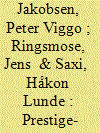| Srl | Item |
| 1 |
ID:
183144


|
|
|
|
|
| Summary/Abstract |
Indo-Pacific has emerged as a region of great movement, conflict and cooperation, contestations and coalition-building. The emergence of minilateral and multilateral cooperation by the middle powers is increasing in the region, with the regional countries enthusiastically mapping the region focussing on their centrality. History proves that the role of middle-power countries became more prominent during the moments of international transition. The two contrasting powers like India and Australia; one with a post-colonial identity in foreign policy-making, subtle emphasis on non-aligned movement (NAM) and emerging as an influential power, and, on the other, a traditional middle power with an alliance structure and regionalism akin to the Western model, have equal stakes in the region and it is inevitable for them to take a leadership position in building what is called a middle power communion in the Indo-Pacific. This article will explore the understanding of middle powers and how India and Australia, as middle powers; are strategically placed and, being great powers within their respective regions; take the responsibility of region-building and maintaining peace with great powers, and how the Indo-Pacific and Quad are emerging as discourses within their foreign policy-making.
|
|
|
|
|
|
|
|
|
|
|
|
|
|
|
|
| 2 |
ID:
148309


|
|
|
|
|
| Summary/Abstract |
This paper elucidates how domestic and external factors have shaped the negotiating policy of the Philippines in bringing about incremental gains not only for its benefit but also for other developing countries during the World Trade Organization (WTO) Agreement on Agriculture Doha Development Round (DDR). The internal factors include the following: (1) executive monopoly of the WTO negotiations; (2) issue-based fragmentation and dispersal of authority; (3) the autonomy and flexibility of the Philippine WTO negotiator; (4) the involvement of civil society in the WTO negotiations, and (4) the central role of the Department of Agriculture as the lead agency in the WTO negotiations. A major reason for this is attributed to an external factor which is the centrality of agriculture as a major WTO issue among developing countries. Other external factors, on the other hand, include the following: (1) the strong solidarity among developing countries and (2) the confinement to particular issues with regards to coalition-building. These factors helped to strengthen the bargaining leverage of the Philippines, a seemingly ‘weak’ country, vis-à-vis the developed countries in the WTO.
|
|
|
|
|
|
|
|
|
|
|
|
|
|
|
|
| 3 |
ID:
158957


|
|
|
|
|
| Summary/Abstract |
In this article we broaden the conventional understanding of prestige and show that prestige-seeking played a major role in the Danish and Norwegian decisions to provide military support to post-Cold War US-led wars. Both countries made costly military contributions in the hope of increasing their standing and prestige in Washington. Both governments regarded prestige as a form of soft power, which they could later convert into access, influence, and US support. Our findings are far from trivial. They make a theoretical contribution by demonstrating that small powers understand and seek prestige in ways that differ fundamentally from the ways great powers do. They also help to explain why smaller US allies made costly contributions to the Balkan, Afghan, Iraq, and Libyan wars at a time when there was no direct threat to their national security and their security dependence on the United States was low. The high value that small US allies attach to their visibility and prestige in Washington suggests that it is far easier for the United States to obtain military support from smaller allies than Realist studies of burden-sharing and collective action problems would lead us to expect.
|
|
|
|
|
|
|
|
|
|
|
|
|
|
|
|